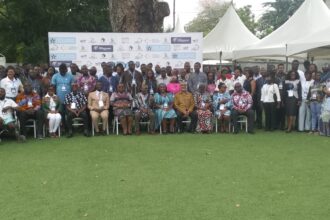An Associate Professor in the Department of Economics at the University of Ghana is calling for the re-assessment of government spending as well as a consideration for improving its tax effort.
Prof Abena D. Oduro delivering the fourth Kwadwo Baah-Wiredu Memorial Lecture said government’s budget is skewed towards consumption expenditure which makes it difficult to achieve its target for development expenditure.
“The fiscal position must be improved. However, we must look beyond the size of the fiscal deficit and interrogate the size of government spending and revenues, the composition of government spending and which groups bear the burden of taxation.
“Ghana’s ratio of government spending to Gross Domestic Product (GDP) and of government revenue to GDP is below the African average. The recent rebasing of the GDP, which revealed that the economy is much larger than was originally thought reveals that the tax and spending ratios are much lower than we thought them to be.”
The Director of the Merian Institute for Advanced Studies in Africa said it means government must ramp up its tax collection effort.
She believes this will provide it with the fiscal space to increase spending in ways that will contribute to the wellbeing of its citizens.
“Political economy dimensions come into play here. Whose income and expenditure should be taxed? The answer is the burden of taxation should be minimised for people at the lower end of the income distribution- this does not mean that they do not pay taxes, but that the share of their income that is paid as taxes should be lower than the share paid by higher income groups.
“Neither individuals nor companies enjoy paying taxes. Which groups are more likely to successfully resist being taxed? The withdrawal of the tax on luxury cars could provide an answer,” she said.
The economist says the country needs more tax revenue to finance its social spending and investment in infrastructure.
“But why should formal sector workers –a very easy group to target in an economy where the informal sector is so large – pay more taxes when they are already paying so much? Why should we pay more taxes when there is evidence each year of embezzlement, waste and downright theft of taxpayers’ money?
“Why should we pay more taxes when the quality of public services that these taxes are supposed to finance leaves a lot to be desired? Why should we pay more taxes when anecdotal evidence suggests that some of us have to make ‘unauthorised’ payments to revenue collectors which do not enter the state’s coffers? The official tax ratio may be lower than the actual if these anecdotes are more than just anecdotes,” she quizzed.
Prof Oduro argues that if tax revenues are to be increased in order to create more fiscal space, then government must address the issues just about waste and theft of the revenues.
Also, says government must explore ways to make it easier for us to pay the required levies and fees.
“Government must reconsider the size of some of the penalties for delayed payment of taxes, to encourage us to pay our taxes on those occasions when we are late. A greater taxation effort, resulting in the increase in taxation of some groups will require an improvement in the quality of government.
“An improvement in the quantum and quality of public services provided must be the carrot offered to the population for them to be willing to accept the increase in revenue generation to finance public expenditure programmes to reduce poverty and inequality,” she said.
Source: Myjoyonline














